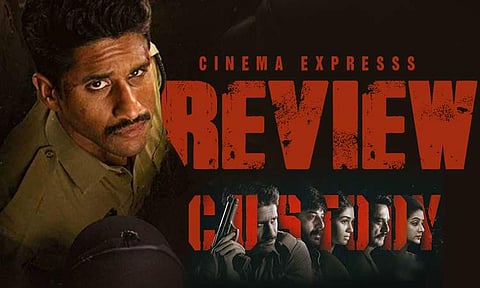Custody Movie Review: Many false starts in a thriller that never gets going
Rating:(2.5 / 5)
For a film that identifies as a thriller, Custody takes a strangely long time—almost 45 minutes or so—before it shows signs of some real life. Much of its opening hour is spent introducing us to the not-so-riveting life details of Naga Chaitanya’s constable character, named Shiva because… need I even say? The film feels devoid of energy and inspiration, as it makes us familiar with the Corrupt Angry Police Boss™, the Talkative Chirpy Sister™, the Fun Drunkard Father™, the Silly Girlfriend™… Through mundane interactions with them, we learn of the Generic Underdog Protagonist™. While impatiently waiting for the story to come to life, we have to negotiate past two strong obstacles: the Hero Introduction Song™ and the Generic Love Song™. All of these are stale ideas from the 90s cinema handbook—and with the treatment feeling like a throwback to that time too, the film may as well not have bothered pointing out that the events are taking place in the year 1998.
Director: Venkat Prabhu
Cast: Naga Chaitanya, Krithi Shetty, Arvind Swami, Sarathkumar, Priyamani
The introduction scene of the heroine, Revathy (Krithi Shetty), is meant to capture her spunk, as she holds her ground in a traffic accident scene. I didn’t think then that it would be the last time we see her being useful, even though she tags along with Shiva for the rest of the film. She works for a driving school, and there is more than one chase scene in this film, and yet, not once does she stop being a hindrance to Shiva (don’t even ask why he’s taking her along during what’s his most dangerous, crucial hours). Perhaps I should have anticipated her lack of purpose right at the beginning when she asks Shiva to shirk police duty to save her from a forced marriage with her boss (Premgi, who’s not funny even once). Shiva’s response: “Nee oru loosu; avan oru loosu”. It’s hard to disagree—especially when you see her, during a time of great urgency, insisting on visiting a fast-food restaurant, so she can eat koththu parotta.
While on food, things spark to life when Arvind Swami (playing a gangster called Raju) comes in before the one-hour mark and gets things looking up with an absurdly funny comment about ‘side-dish’. Likewise, Sarathkumar—who exudes great screen presence as always—comes in armed with an energetic background score (Yuvan Shankar Raja) reminiscent of SJ Suryah’s arrival in the director’s previous film, Maanaadu. However, in that film, the antagonist posed a real threat and was engaged in an even battle of wits with the hero; here, Sarathkumar, playing a senior cop called Nataraj, comes in with style each time, but also keeps getting thwarted each time.
Raju, incidentally, offers some enjoyable repartees that come loaded with meaning—like when he questions why cops and armed forces personnel are so self-righteous, when they too, like him, are mere puppets of politicians. It’s a brave question to raise, but in a more effective film, it might have mattered more. Also, Arvind Swami, attempting local gangster thamizh, doesn’t exactly scream authentic.
This film is the latest in a long list of Tamil-Telugu bilinguals to suffer from lip-sync issues. Naga Chaitanya’s Tamil betrays the discomfort of a Telugu speaker and is a big distraction throughout. That said, I did enjoy the narrative ideas concerning his character, Shiva. It’s a Venkat Prabhu film; so, there’s no dearth of ideas. Shiva dealing with the regret of having caused at least two deaths. Shiva realising that the enemy isn’t who he thought. Shiva beginning to see an enemy as an unlikely brother figure. There’s some political subtext in the film too, with talk of a State party replacing a national party, and a woman chief minister capitalising on the sympathy of a dead male leader. I’ll leave all of these easy interpretations to you but suffice it to say that given the little we learn of characters played by Priyamani and YG Mahendra, none of this truly registers. Yet, I had the niggling feeling that the film seemed to stand in support of—even if not emphatically—the central agencies, as opposed to the state law force.
Reflecting on the film as a whole, I’m tempted to pick up a Raju quirk as a metaphor. Throughout the film, he’s constantly asking for a matchstick to light his beedi. In a sense, I was searching for some fiery idea to set the story alight too. A couple of stunt sequences show technical finesse—one extended, chaotic fight scene in the police station captures the messy violence in a cramped space. But then again, these are stray joys in a mostly joyless film. The composer credit is shared by both Ilaiyaraaja and Yuvan Shankar Raja, but by and large, the music isn’t exactly notable (one interesting stretch that ends with Shiva slapping Premgi’s character is an exception). In fact, when Shiva loses a loved one, Ilaiyaraaja’s score pitches in with a predictable, melodramatic lament straight from the 90s. It’s an unsuitable fit for Venkat Prabhu’s self-aware cinema that often breaks the fourth wall. Through the film, we keep seeing visual reminders of how long Shiva has to reach his destination (24 hours to go, 12 hours to go…), but this only exacerbated my feeling of restlessness. In fact, the last time such a reminder pops up (7 hours to go), I found it hard to shake off the worrying suspicion that it might be a reference to the remaining duration of the film.

